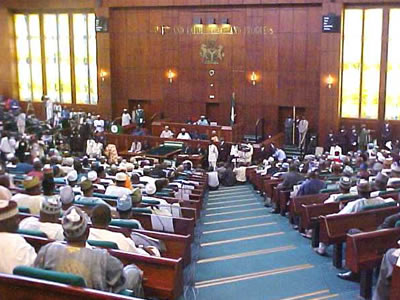The Senate has vowed that it will compel President Goodluck Jonathan and future presidents to periodically address the nation on state of affairs via a state of the Nation Address on the floor of the National Assembly.
They emphasised that presidential media chats and the ceremonial budget speech by the president in NASS does not have constitutional enforcement hence the president can decide not to have the chats or just lay the budget proposal without addressing the nation.
The upper chamber having passed for second reading a Bill for the President of the Federal Republic of Nigeria to make a state of the nation address on the floor of the National Assembly stressed it would not delay to veto the Bill if President Jonathan refuses to sign it, like he did before.
The position of the Senate was conveyed by the Deputy President of the Senate, Ike Ekweremadu who while presiding over the debate, said death deprived late President Umaru Musa Yaradua, who was excited by the Bill, from signing it into law.
Ekweremadu the first sponsor of the Bill in 2004 and later in 2007 and
2008 said the Bill was frustrated in 2004 by the Executive.
However the Bill as revived in this Senate was recently passed in the House of Representatives and forwarded to the Senate and sponsored by the Leader of the Senate, Senator Victor Ndoma-Egba.
The Deputy Senate President said ” the bill emanated from the house of representatives so it is not exactly the same as the one passed in the Senate which I sponsored. What we passed was quite deeper and more detailed than what we have here. Our option might be while we send this to the committee and we will also dust up the other Bill and send it to the committee to consolidate them. I recall that even in that other Bill there is a provision for the ministers to send their report cards to the appropriate committees and if they are not satisfied the committees could paSs a resolution for the ministers to be dropped. It was very quite detailed.”
He continued “essentially the aim of the state of the nation address is to get the president to point a direction for the country and then for the parliament through their debate to reflect these policy direction. Then on a need to know basis, those who are being governed are entitled to know what the government is doing and how he is addressing the nation.”
In his explanation why the Bill was killed in the past, Ekweremadu stated:
“I introduced the original bill sometime in 2004 and it went to a public hearing. The government sent its representatives to oppose it on the basis of section 67 where they said that the section 67 has made provision for the president to come to the National Assembly during a joint sitting or sitting of senate or house.
“But if you look at section 67 it is not compulsory, it is actual optional for the president to come. Those who crafted the constitution I believe meant well but unfortunately they did not make it as compulsory as other countries.
“We felt that there is need for us to make it compulsory for the president to appear before the national assembly and make a state of the nation address. So when that happened we again introduced it in the following senate, 2007 and again in 2008.
“And to make sure that the bill does not suffer the same of opposition by the executive, I discussed the matter with the president Yaradua and I explained to him the need and the difference between what we are doing and what the constitution says and he was excited to be the first president to make a state of the nation address. Unfortunately by the time the bill was passed he had died. And then it was the present president who had the opportunity to preside over the issue of the Bill. And he did not sign the bill.
“Regrettably this was just towards the end of the last Senate and we did not have the opportunity of bring it back to override it. So when we resumed this time around a member of the House of Representatives pick it up and sponsored it. So we would have over written the veto if we had the time to do so. But technically, at the end of that session both Houses had desolved and all the Bills need to start afresh. So it is not that we didn’t know what to do.
“We believe that this time around, the president would sign it. And if it is not signed, you know the president’s political affairs adviser advised us that if the president refuses to sign any bill we know what to do. So this will be the first time we will take his advise.
Earlier Sen. Ndoma-Egba, said the Bill does not accrue any financial implication adding that it would not foreclose presentation of annual budgets nor to duplicate its functions. He noted “that the idea of the Bill is to take stock of the nation, its condition, the governments and its performance; the people and their well being”.
The Bill was overwhelmingly supported by Senators who contributed in the debate as Senators said the Bill would go along way in reducing the number of motions and resolutions by NASS as well as enrich the democratic process.
Some however pointed out that the Bill does not offer what option would be adopted by the Senate if the president refuses to comply.



